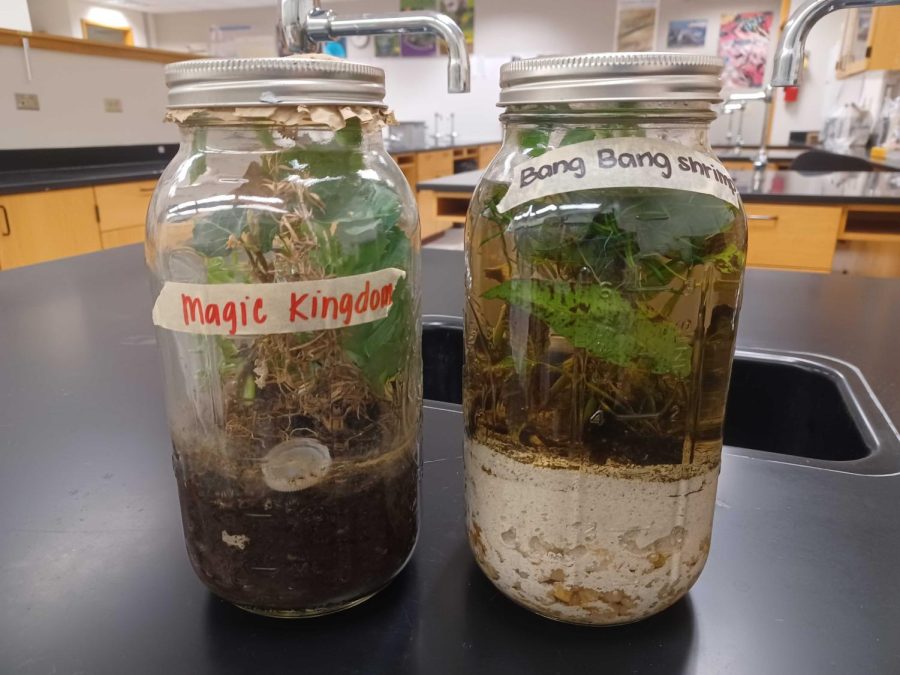Over the past three weeks, AP Biology students have been working on a biodiversity project. For this project, students used large mason jars to create a self-sustaining ecosystem that is either aquatic or non- aquatic. Students must keep this jar alive by using their knowledge of Biology to create a balanced ecosystem within it. AP Biology teacher, Daniel Marble explained the importance of the project,
“Our last unit of the year is this ecology unit,” Marble said. “We try to come up with a project because we are a part of the project-based learning (initiative), which allows students to implement and understand all the aspects of the unit in one little jar.”
This project, while it coincides with the material being observed and learned during the course over the three week period so far, requires students to use their knowledge of biology to a further extent than what they normally do in the class. Marble said students must observe biodiversity in its natural form and understand specific aspects of what biodiversity is. Chloe Winn, AP Biology student and senior, said there is a lot for students to consider.
“How ecosystems work and what’s in it (them) will affect it (them). So if you have too much diversity there will be mass extinction. If you don’t have enough, nothing is going to survive,” they said.
So far, Marble said the project has been successful, but he said it is also too early to tell if some student ecosystems will fail. He said as students observe either projects over time,many will be surprised and informed about how critical ecosystems are.
“(Students often) Underestimate how good organisms are at decomposing things.” Marble said. “Probably in the next couple weeks some of our little jars back there are going to start to decompose because they don’t have enough oxygen to be self-sufficient.”
Although the project has had its ups and downs for students, Winn said they have enjoyed it so far. Winn said the project has furthered their existing knowledge about ecology and has allowed them to explore it in their own way outside of a textbook. They said,
“I think it’s really interesting just being able to see how you can put a lot of things together from your backyard, and seeing how it all goes together,” they said.
Lourdes Bengero, AP Bio student and senior said she enjoys the project. She said, “(My favorite part of this project is) collecting all the specimens because I did a lot of the collection of resources for my group.”
Bengero said she learned many valuable lessons during this project.
“(I) learned the lesson that less is more because we put too many things in our terrarium which caused a lot of unbalance.”
































![What happened to theater etiquette? [opinion]](https://hilite.org/wp-content/uploads/2025/04/Entertainment-Perspective-Cover-1200x471.jpg)













































![Review: “The Immortal Soul Salvage Yard:” A criminally underrated poetry collection [MUSE]](https://hilite.org/wp-content/uploads/2025/03/71cju6TvqmL._AC_UF10001000_QL80_.jpg)
![Review: "Dog Man" is Unapologetically Chaotic [MUSE]](https://hilite.org/wp-content/uploads/2025/03/dogman-1200x700.jpg)
![Review: "Ne Zha 2": The WeChat family reunion I didn’t know I needed [MUSE]](https://hilite.org/wp-content/uploads/2025/03/unnamed-4.png)
![Review in Print: Maripaz Villar brings a delightfully unique style to the world of WEBTOON [MUSE]](https://hilite.org/wp-content/uploads/2023/12/maripazcover-1200x960.jpg)
![Review: “The Sword of Kaigen” is a masterpiece [MUSE]](https://hilite.org/wp-content/uploads/2023/11/Screenshot-2023-11-26-201051.png)
![Review: Gateron Oil Kings, great linear switches, okay price [MUSE]](https://hilite.org/wp-content/uploads/2023/11/Screenshot-2023-11-26-200553.png)
![Review: “A Haunting in Venice” is a significant improvement from other Agatha Christie adaptations [MUSE]](https://hilite.org/wp-content/uploads/2023/11/e7ee2938a6d422669771bce6d8088521.jpg)
![Review: A Thanksgiving story from elementary school, still just as interesting [MUSE]](https://hilite.org/wp-content/uploads/2023/11/Screenshot-2023-11-26-195514-987x1200.png)
![Review: "When I Fly Towards You", cute, uplifting youth drama [MUSE]](https://hilite.org/wp-content/uploads/2023/09/When-I-Fly-Towards-You-Chinese-drama.png)
![Postcards from Muse: Hawaii Travel Diary [MUSE]](https://hilite.org/wp-content/uploads/2023/09/My-project-1-1200x1200.jpg)
![Review: "Ladybug & Cat Noir: The Movie," departure from original show [MUSE]](https://hilite.org/wp-content/uploads/2023/09/Ladybug__Cat_Noir_-_The_Movie_poster.jpg)
![Review in Print: "Hidden Love" is the cute, uplifting drama everyone needs [MUSE]](https://hilite.org/wp-content/uploads/2023/09/hiddenlovecover-e1693597208225-1030x1200.png)
![Review in Print: "Heartstopper" is the heartwarming queer romance we all need [MUSE]](https://hilite.org/wp-content/uploads/2023/08/museheartstoppercover-1200x654.png)



